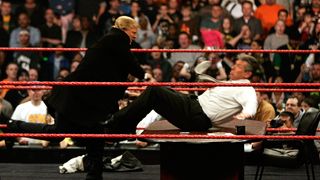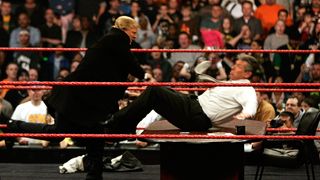"The President in no way, form, or fashion has ever promoted or encouraged violence. If anything, quite the contrary." So said Sarah Huckabee Sanders, the President's new spinmeister, last week. Like so many statements made in front of the White House seal, this one was demonstrably false. Trump is, after all, the campaigner who saw a protester and said "I'd like to punch him in the face" and suggested "Second Amendment people" could stop Hillary Clinton.
But just in case that record didn't speak for itself, Trump quickly indulged in a new bout of bloodlust. On Sunday, he tweeted a clip of himself performing in WrestleMania 23, body-slamming and viciously punching an opponent that was now labelled "CNN".
"The President in no way, form, or fashion has ever promoted or encouraged violence. If anything, quite the contrary."Sarah Huckabee Sanders, Principal Deputy White House Press Secretary
The President's fascination with pro wrestling, the staged sport where sweat-slicked, thick-muscled athletes pretend to beat one another senseless, is well known. He's even appeared in matches like WrestleMania several times over the past few decades, earning him a spot in the "celebrity wing" of pro-wrestling's hall of fame.
But pro wrestling is more than just one of Trump's pastimes. It's also a spot-on metaphor for Trump's tenuous grasp on the distinctions between reality, spectacle, and violence. Does he call for violence because he sees it as harmless entertainment or because he lusts for it? Probably a bit of both. But unlike pro wrestling, which seldom has real-world consequences, Trump's attacks on the press pose a legitimate threat to America's free media.
Though the imagery of Trump physically assaulting the media is new, it is part of a larger strategy to discredit and abuse the press. He attacks the media because he understands its power: media outlets have been shaping his career from his time as an upstart builder first clawing his way into the Manhattan real-estate market.

The news that broke this week – that Trump may have tried to blackmail the hosts of MSNBC's Morning Joe – should come as no surprise to anyone familiar with the strategy of bully-flatter-leak-attack that he used regularly with the New York tabloids. Now as then, Trump yearned for the press's love and attention. He rarely got it, so feasted on its disdain while longing for its acceptance.
Trump has brought that brawling style into the White House. First step: discredit the media. Hence the cries of fake news that regularly emanate from the administration.
Those who care about things like true and false may find Trump's logic confusing: well-reported stories are dismissed as fake while rumours and lies are presented as fact. But that misunderstands Trump's relationship to reality, which fits more neatly on the axis of pro wrestling. Are you loved or are you hated? Is the crowd with you or against you? It's not fraudulence but favourability that Trump cares about.
Unlike pro wrestling, which seldom has real-world consequences, Trump's attacks on the press pose a legitimate threat to America's free media.
Hungry for acceptance, in the early days of his campaign Trump bobbled between praising and cajoling the press. For a while, Trump and the media struck a delicate balancing act: addicted to the ratings boost, networks would give Trump all the airtime in the world. It was good for ratings, and after all, Trump had no chance of becoming president, so why not entertain viewers with his pro-wrestling-style campaign?
As Trump's campaign became more consequential, and as his attacks and policy pronouncements grew more vicious, those relationships soured. News outlets became more critical and less pliant. So Trump struck back.
His campaign rallies became orgies of press abuse. The campaign kept the media in a pen, corralled so that the rally-goers could hurl abuse at them. From rude gestures to mocking taunts to chants of "CNN sucks", the rally-goers happily played along.
Trump's relationship to reality fits more neatly on the axis of pro wrestling. Are you loved or are you hated? Is the crowd with you or against you? It's not fraudulence but favourability that Trump cares about.
Sometimes these taunts turned darker. Lugenpresse entered the American political lexicon during 2016, borrowed from Nazi rallies in the 1930s when pro-Hitler Germans taunted the "lying press".
Nor did attacks on the press stay on the campaign trail. During a special election in Montana earlier this year, Republican candidate Greg Gianforte body-slammed a Guardian reporter. Gianforte was charged and convicted of assault. But politically, the incident had no more consequences than a WrestleMania match: donations poured into Gianforte's campaign, and the day after assaulting the reporter, Gianforte won the election.
Given this outpouring of support for Gianforte's assault, it is tempting to conclude that Trump is simply tapping into his base's anger at the media. But Trump isn't just pointing to that anger. He's sharpening it, curdling it. And he is doing so because attacking the press works as both spectacle and weapon, an opportunity to entertain his base and embolden their hatreds.
Presidents have long tangled with the press. But it's one thing to resent and cajole the media, as just about every president has done. It's quite another to deny that they have a legitimate role in democratic governance. Yes, the press should be challenged and criticised, but to make it better, not to beat it into submission. That is the danger Trump poses, and why his tilt back toward political violence is so troubling – even if for him, it's no more real than a wrestling match.






